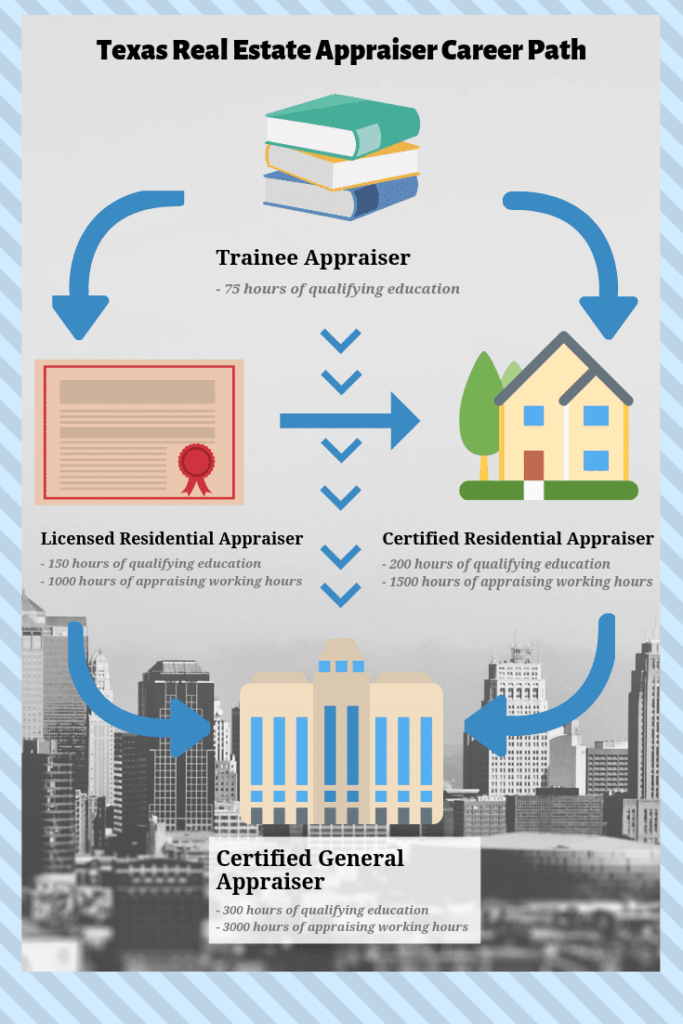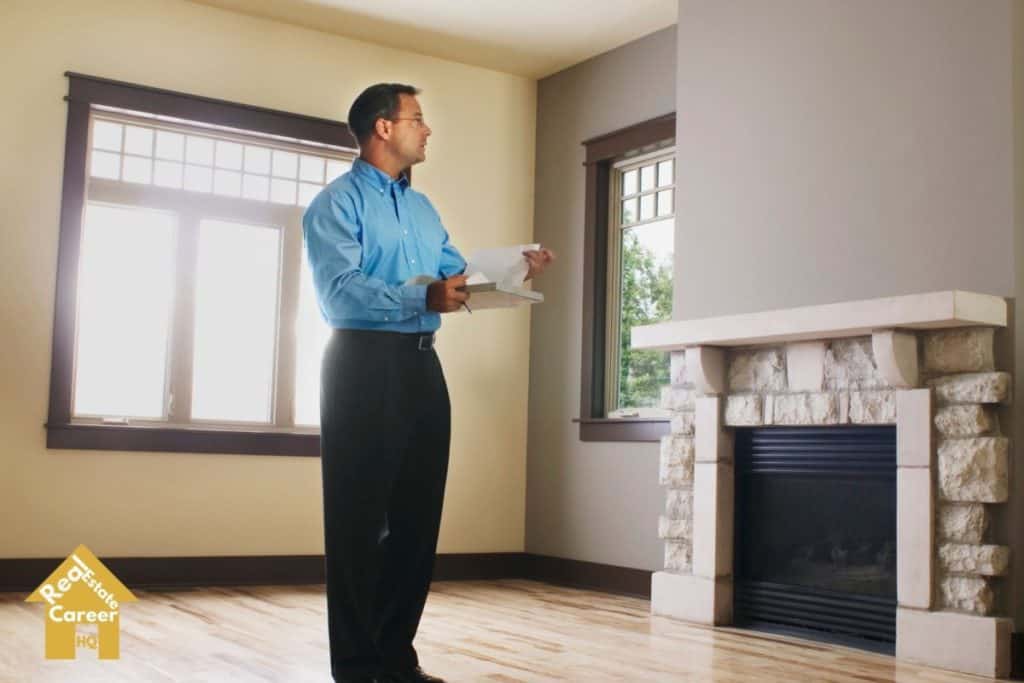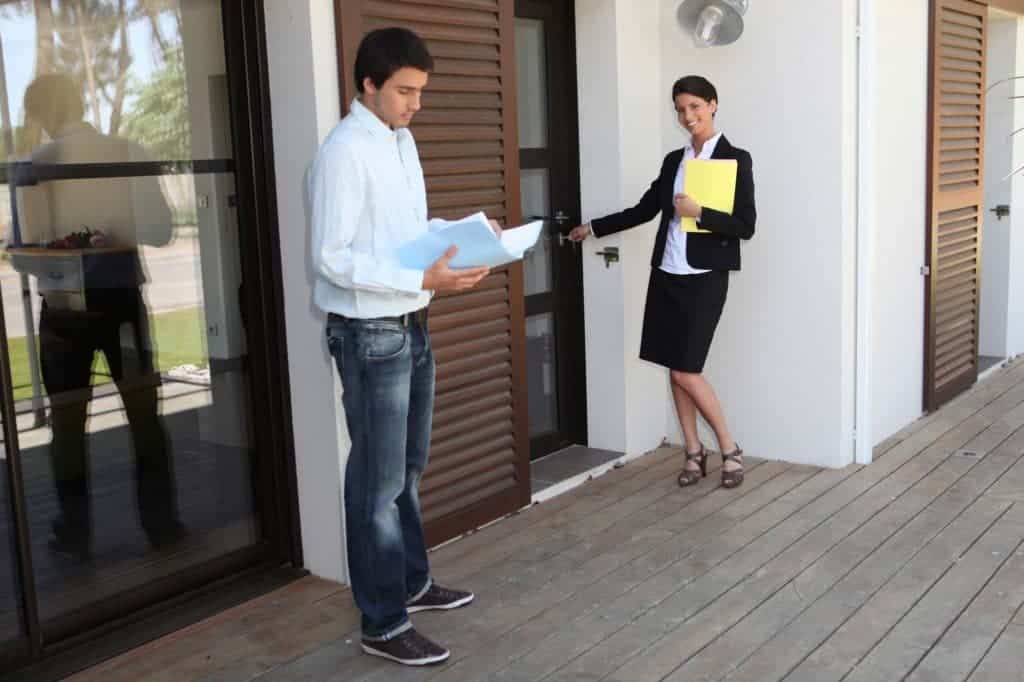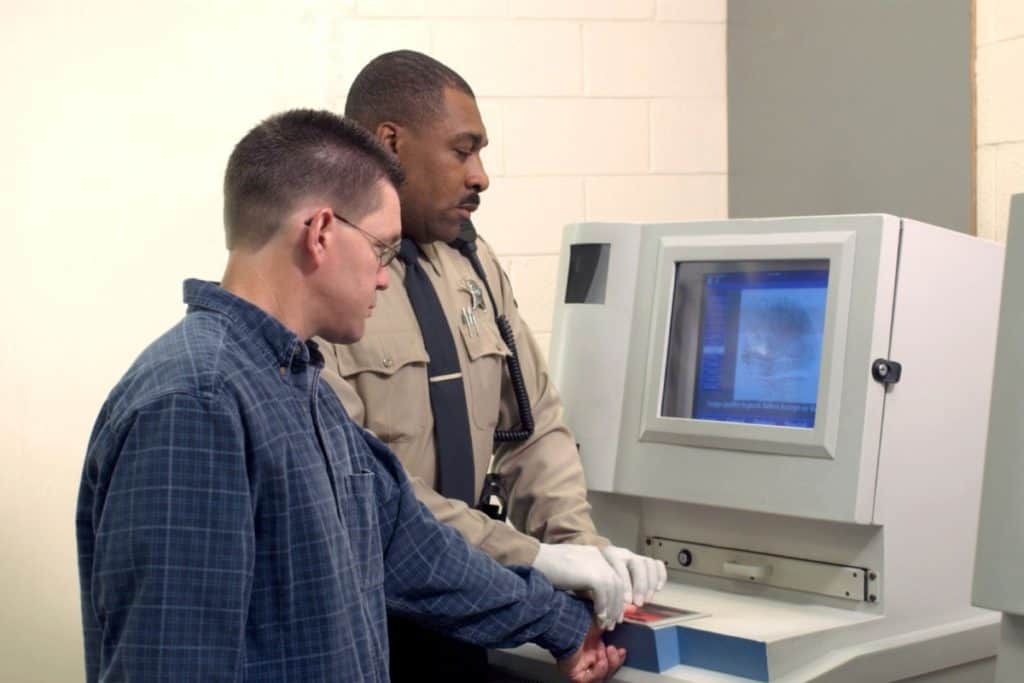(**) Disclosure: This post may contain affiliate links, meaning RealEstateCareerHQ.com will get a commission if you decide to make a purchase through the links, but at no additional cost to you.
If you are thinking to become a real estate appraiser in Texas, this is the perfect career guide for you.
The Texas Appraiser Licensing & Certification Board (TALCB) is the board which issues licenses and regulates the appraiser industry. There are four types of appraisers in Texas, Registered Trainee Appraiser, Licensed Residential Appraiser, Certified Residential Appraiser and the Certified General Appraiser.
To become a real estate appraiser in Texas, an applicant must:
- Complete 75-hour pre-licensing appraisal courses (including 15 hours of USPAP) and an AQB approved Supervisory/Trainee course)
- Apply for the Registered Trainee Appraiser license
- Work under the supervision of a certified appraiser
- Complete the LR/CR/CG appraisal courses
- Pass the state appraisal exam
- Acquire work hours experience (1000 for LR, 1500 for CR, 3000 for CG)
- Submit a license application and fees to the Texas Appraiser Licensing & Certification Board (TALCB)
- Upgrade to a Licensed Residential/ Certified Residential/ Certified General Appraiser license.
As a real estate appraiser, your job is to assess the market value of properties in a professional and unbiased manner.
The purpose I’m writing this guide is to help you better understand the career of being a real estate appraiser in Texas. Here, you will find the steps to obtain each level of Texas appraiser license, the pre-licensing courses, exam requirements, income figures, and other FAQs about this profession. So whether you’re just starting out in your career or you’re looking for a new challenge, read on!
But before we start, I want to give a brief disclaimer. This post is not intended as legal advice or state/federal real estate appraisal training. It is for general information only. Always follow your State Laws and best practices.
The first step to your appraisal career is to complete the pre-licensing courses from a trusted education provider. McKissock received an incredible rating from its students, and their online lessons are taught by instructors who have actual experience in the appraisal industry. You may click here to find out more about their courses. (**)
Table of Contents
- An infographic on Getting a Real Estate Appraiser License in Texas
- What does a Registered Trainee Appraiser do in Texas?
- How to Become a Registered Trainee Appraiser in Texas?
- Career tips for Trainee Appraiser in Texas
- What does a a Licensed Residential Appraiser do in Texas?
- How to Become a Licensed Residential Appraiser in Texas?
- What does a Certified Residential Appraiser do in Texas?
- How to Become a Certified Residential Appraiser in Texas?
- What does it a Certified General Appraiser do in Texas?
- How to Become a Certified General Appraiser in Texas?
- Provide fingerprints to the Texas Department of Public Safety (DPS)
- A Video Summary on Getting a Real Estate Appraiser License in Texas
- FAQ on the Texas Real Estate Appraiser Career
- Career Tips for Appraisers in Texas
- Here are more incredible resources to learn about the Texas real estate appraisal career!
An infographic on Getting a Real Estate Appraiser License in Texas

What does a Registered Trainee Appraiser do in Texas?
This is the first step to the real estate appraiser industry. With this designation, you will work alongside with a certified appraiser as your supervisor.
This is where you can receive training and gain some hands-on experience of being an appraiser. Duties could involve doing research on properties, working on reports, or even inspect properties together with the supervisor.
Finding a good mentor is essential. Your supervisor should educate you on practical technique to obtain information about a property, how to analyze them in coming up with an unbiased market value of the property.
Of course, it is important your supervisor will walk you through the entire appraisal process and spend the time in answering your questions.
How to Become a Registered Trainee Appraiser in Texas?

Step 1: Meet the eligibility requirement
- At least 18 years old
- Citizen of United States or a lawfully admitted alien
- Legal resident of Texas for at least 60 days
Step 2: Complete the pre-licensing courses
You’ll need to complete 75 hours of real estate appraisal related education from an approved course provider, which must include:
- 30 hours of Basic Appraisal Principles
- 30 hours of Basic Appraisal Procedures
- 15 Hours of National USPAP or Equivalent
In addition, you are required to take 4 hours of Appraiser Trainee/Supervisory Appraiser Course. All courses need to be completed no more than 5 years before submitting the licensing application.
Study tip: Whenever possible, I prefer to take online courses. You can study at your own pace at the convenient of your home, library, or wherever there is internet access. Here’s an article review of an online school that I like.
Step 3: Work under the supervision of a Certified Appraiser

In Texas, you could work alongside with more than one supervisory appraiser. However, a supervisor cannot be responsible for more than 5 trainees at any given time.
To verify whether an appraiser is eligible to supervise any trainee, you could check out their status in the National Registry of the Appraisal Subcommittee website.
A supervisor needs to be either a Certified Residential Appraiser or a Certified General Appraiser, which will be responsible for your Appraiser Trainee conduct to the public and the board. They are required to sign all your appraisal reports.
Some people are concerned it could be difficult to find a mentor. But at the time we are writing this post, we do see there are job openings for Appraiser Trainee from numerous companies.
Here are “The Top 10 Tips to Find a Supervisory Appraiser“.
Step 4: Submit application to the Texas Appraiser Licensing & Certification Board (TALCB)

Here is the requirement to apply for approval as an Appraiser Trainee,
- Complete the application form # AAT-8
- A fee of $325 payable to the TALCB
- Proof that you have fulfilled the required education
In the application, there will be some background questions. Your supervisor also needs to complete and sign the form.
Once you have prepared all the necessary documents, you could mail them to the Texas Appraiser Licensing & Certification Board (TALCB). The mailing address is on the first page of the application.
Now, there is an easier way to apply, which is through their online licensing services. Not only that it would be faster, but it would be $20 cheaper. Then you could email your education proof to documents@talcb.texas.gov.
Step 5: Provide fingerprints to the Texas Department of Public Safety (DPS)
This is actually a common step when registering as an Appraiser Trainee, Licensed/Certified Residential Appraiser or Certified General Appraiser.
Here’s what I asked a Real Estate Appraiser Trainee about working with a supervisor

Jacob: “Is there anything you have learned in the field or from your supervisor that was not covered in the class?”
Katie: “Yes, I have learned so much through both my supervisor and working in the field. Through this, it has taught me how to properly measure a home, how to notice differences in materials used throughout the home, how to properly deal with clients (answering such questions that may come about or just overall explaining the process of how the appraisal works.)”
I conducted a full interview with Katie Holland, where she shared her journey and thought about the real estate appraisal industry. Be sure to check it out!
Career tips for Trainee Appraiser in Texas

1) Maintain appraisal experience logs
While working as a Trainee Appraiser, you and your supervisor are required to keep logs of your working experience.
You must use the TALCB “Appraisal Experience Log” (AEL 7-2) to do so. Here’s the link to download the form.
You would keep track of details such as the report date, subject location, and the type of report. It will outline the hours you spent on inspecting the site, neighborhood, doing the various analysis, etc.
You and the supervisory appraiser must sign and date each page of the log. Here are the Appraisal Experience Log Instructions from the TALCB.
This is a crucial task for your future advancement in becoming a licensed or a certified appraiser in Texas. (Which I will also discuss later in the post)
2) Voluntary review of appraisal work product

When I was reading an appraiser industry forum, there had been a very interesting question. If an Appraiser Trainee is doing a “drive-by” appraisal alone, will that work be counted toward the appraising experience?
Although I don’t have the answer to that, you definitely would not want the thousand hours of hard working experience go into jeopardy because they are not complying with TALCB guideline.
To resolve this issue, you could consider doing a “Voluntary Review of Appraisal Work Product.”
This is where a TALCB compliance will review some of your submitted work files or sample appraisal reports from your experience log. Then they would provide you with valuable feedback whether your work complies with the Uniform Standards of Professional Appraisal Practice (USPAP).
If they identify there is any work product that is USPAP deficiencies, then it is important you and your supervisor would address them asap.
You may request for this review after finishing 500 hours and 1,000 hours of appraising works. There is a $75 processing fee. Here’s the link to download the Application for Review of Trainee Work Product.
This review could help you to have a deeper understanding about the USPAP so that you can better prepare for a successful audit experience when it comes to applying for a higher designation.
Now you have become a Trainee Appraiser. Welcome to the real estate appraising industry!
What does a a Licensed Residential Appraiser do in Texas?

Not every state still has this designation, but Texas is one of those who does.
As a Licensed Residential Appraiser, you are authorized to appraise:
- non-complex residential 1-4 unit properties with a transactional value less than $1,000,000
- complex transactions with a value less than $400,000
To give you an idea of the duties involved as a Residential Appraiser, here’s a snippet of an actual job description from First American Financial Corporation, they are a provider of title insurance protection and settlement services to the mortgage and real estate industries.
… Conducts an unbiased and impartial assessment of market areas, statistics, and other pertinent information regarding specific properties, analyzes data, and develops an estimate of property value in accordance with government, company, regulatory board, and client specific guidelines.
– Documents on-site assessments with photographs, measurements, similar sales values, and demographic information.
– Draws land diagrams and other visual documentation.
– Considers all factors that could influence property value including land, neighborhoods, trends, future community changes, shopping centers, schools, parks, etc. This also includes the construction, condition, special features and functional design.
– Generates fee quotes.
– Presents final evaluations and property value estimates to home buyers, sellers, investors, creditors, leasing and real estate agents…”
How to Become a Licensed Residential Appraiser in Texas?

Step 1: Meet the eligibility requirement
- 18 years of age or older
- Citizen of the United States or a lawfully admitted alien
- An associate’s degree or higher or 30 semester credit hours from an accredited college or university
Step 2: Complete the required hours of working experience
- You must have a minimum of 1000 hours of appraisal experience where they need to be acquired for over a 6 months period.
- As mentioned before, your experience logs and work products will be reviewed by a TALCB staff. Only verifiable and acceptable working experience will be counted toward meeting the requirement.
Step 3: Fulfill the education requirement

You’ll need to complete 150 hours of qualifying appraisal education from an approved course provider. The Appraiser Qualifications Board (AQB) requires the core curriculum to include:
- 30 hours of Basic Appraisal Procedures
- 30 hours of Basic Appraisal Principles
- 15 hours of National USPAP or Equivalent
- (+) 15 hours of Residential Appraiser Site Valuation and Cost Approach
- (+) 15 hours of Residential Market Analysis and Highest and Best Use
- (+) 30 hours of Residential Sales Comparison and Income Approaches
- (+) 15 hours of Residential Report Writing and Case Studies
You should have completed some of the courses when becoming an Appraiser Trainee. Therefore, you only need to take another 75 hours of classes.
Here’s a review of an online appraisal school that I wrote. In there, you will find out why so many students like about it.
(+) Additional courses an Appraiser Trainee is required to take in becoming a Licensed Residential Appraiser.
Step 4: Register with the Texas Appraiser Licensing and Certification Board
To do so, you are required to complete the “APPLICATION FOR LICENSED RESIDENTIAL APPRAISER” Form# AL-7.
In addition to the application, you’ll also need to provide:
- Fees: $350 payable to TALCB
- Evidence which shows you have completed the education and working experience requirement
Then you could mail the complete set of documents to the TALCB. Their P.O Box address is printed at the top of the first page.
Alternatively, you could apply through their online services. In fact, you could save $20 when applying online.
Here’s the link to login or create a new user account. You could email the supporting documents of your education and working experience to documents@talcb.texas.gov.
Regardless of how you submit your application, once all the requirements are met, there will be another $80 fee to the National Registry.
Step 5: Pass the Licensed Residential Appraiser Exam

Once the board has verified your education and appraising experience, they will notify you with details about writing the TALCB Licensed Residental Appraiser exam.
This is a 4 hours exam, with 125 questions, of which only 110 will be counted, the remaining 15 are pretest questions. The exam fee is $54.
To my understanding, the score report will be available at the test center right after you complete the examination.
To schedule the exam writing, you could visit www.pearsonvue.com.
For more information about the exam, you could review the “Texas Real Estate Appraiser Licensing and Certification Candidate Handbook.” The section about the Licensed Resident Appraiser Exam is on page 1 to 4. They also have some sample exam questions on page 13.
To increase your chance in passing the exam on the first time, make sure to check out our exam hacks. In there, not only you will find the content of the exam, but also 10 effective tips on how to prepare for it.
Step 6: Provide fingerprints to the Texas Department of Public Safety (DPS)
You could skip this step if you have already fulfilled this requirement when you were registering as an Appraiser Trainee in Texas.
What does a Certified Residential Appraiser do in Texas?

A Licensed Residential Appraiser has some certain limitations in the transactional value of the properties that can be appraised.
Although the titles might sound similar, the Certified Residential Appraiser designation opens up a wider range of appraising opportunity.
As a Certified Residential Appraiser, you can appraise for properties with 1 to 4 residential units regardless of the transaction value or complexity. Vacant or unimproved land for which the highest and best use is for 1-to-4 family purposes.
Furthermore, it is not mandatory to become a Licensed Residential Appraiser before being Certified. You could start working toward this designation even when you are still an Appraiser Trainee.
Here’s a Snippet of What Jamie Owen Thinks About Being a Real Estate Appraiser!

“The more you learn, the more you will enjoy being an appraiser.”
“I think that humility and honesty are the most important attributes. Humility is important because if we think we know it all, we are going to be in trouble. Being appraiser requires not being thin-skinned and defensive. Others have their opinions and we have ours. Both may be supportable in one way or another.
Being humble helps us to respect the views of others and not be offended if others have a different view. Humility also helps with business relationships, as well as accepting guidance and reminders when we need them, from peers and others.”
– Jamie Owen, Certified Residential Real Estate Appraiser at Aspen Appraisal Services
Here’s an exclusive interview with Jamie. He shared with us his journey and valuable experience in the appraisal industry. You’ll also learn what it is like to be a real estate appraiser nowadays.
How to Become a Certified Residential Appraiser in Texas?
Step 1: Meet the eligibility requirement
- At least 18 years old
- The United States citizen or a lawfully admitted alien
- Fulfill one of the following 5 college-level education requirement:
- Route #1: Hold an associate’s degree in either Accounting, Business Administration, Economics, Finance, or Real Estate; OR
- Route #2: Hold a bachelor’s degree in any field of study
- Route #3: Complete 3 hours of each of the following college-level courses with a total of 30 semester hours
- Algebra, Geometry, or Higher Math
- Computer Science
- English Composition
- Finance
- Macroeconomics
- Microeconomics
- Real Estate Law or Business Law
- Statistics
- 2 elective courses (3 hours each) in any of the above subjects or in Accounting, Agricultural Economics, Business Management, Geography, or Real Estate;
- Route #4: Complete 30 hours of College Level Examination Program® (CLEP®) examinations that cover each of the subjects in Route #3
- Route #5: Any combinations of Route #3 and Route #4 which consists all the topics mentioned above
However, if you have been a Licensed Residential Appraiser for 5 years or more, while your license is in good standing, then the college-level requirements can be waived.
Step 2: Obtain the appraisal work experience

You need to acquire a minimum of 1500 hours of appraisal experience over a minimum of 12 months period.
If you already fulfilled the 1000 hours of working experience when you became a Licensed Residential Appraiser, then you’ll only need an addition of 500 hours.
Step 3: Complete the CR appraisal courses

You are required to complete 200 hours of qualifying appraisal education from an approved course provider. The Appraiser Qualifications Board (AQB) requires the core curriculum to include:
- 30 hours of Basic Appraisal Principles
- 30 hours of Basic Appraisal Procedures
- 15 hours of National USPAP or Equivalent
- (+) 15 hours of Residential Market Analysis and Highest and Best Use
- (+) 15 hours of Residential Appraiser Site Valuation and Cost Approach
- (+) 30 hours of Residential Sales Comparison and Income Approaches
- (+)15 hours of Residential Report Writing and Case Studies
- (+)(++)15 hours of Statistics, Modeling and Finance
- (+)(++)15 hours of Advanced Residential Applications and Case Studies
- (+)(++)20 hours of Appraisal Subject Matter Electives (20 Hours)
You should have completed some of the courses when becoming an Appraiser Trainee or Licensed Residential Appraiser.
If you are upgrading your license from Appraiser Trainee, you only need to take another 125 hours of classes. (+) are the additional courses an Appraiser Trainee is required to take in becoming a Certified Residential Appraiser.
If you are upgrading your designation from Licensed Residential Appraisal, you only need to take another 50 hours of classes. (++) are the additional courses an Licensed Residential Appraiser is required to take in becoming a Certified Residential Appraiser.
In both scenarios, you also need to provide proof that you have taken the 15 hours of National USPAP course after Feb 1st, 2002.
Step 4: Apply to the Texas Appraiser Licensing and Certification Board

To do so, you are required to complete the “APPLICATION FOR CERTIFIED RESIDENTIAL APPRAISER” Form# CRA-6.
In addition to the application, you’ll also need to provide:
- Fees: $375 payable to TALCB
- Documents which proves you have fulfilled the education and working experience requirement (Just the copies are fine, no need to mail in originals)
Then you could mail the complete set of documents to the TALCB. Their mailing address on the front page of the application.
However, I would recommend you to apply through their online services. Not only it is quicker and more convenient, but you could also save $20 of the paper filing fee. Then you could email the supporting documents of your education and working experience to documents@talcb.texas.gov.
Regardless of how you submit your application, once all the requirements are met, there will be an $80 fee to the National Registry.
Step 5: Pass the Certified Residential Appraiser Exam

Once the board has verified your education and appraising experience, they will notify you with details about writing the TALCB Certified Residential Appraiser exam.
This is a 4 hours exam, with 125 questions, of which only 110 will be counted, the remaining 15 are pretest questions. The exam fee is $54.
The score report will be available at the test center right after you complete the examination.
Here’s the link to reserve seating for the exam writing.
You could review the “Texas Real Estate Appraiser Licensing and Certification Candidate Handbook.” for more information about the exam, The section about the Certified Resident Appraiser Exam is on page 5 to 8.
Step 6: Fingerprints and background check
It is very likely you could skip this step because you probably had fulfilled this requirement when you were registering as an Appraiser Trainee or Licensed Residential Appraiser.
What does it a Certified General Appraiser do in Texas?

The Certified General Appraiser license is the highest one you could get in this appraisal industry. You will have the authority to assess all types of real property. The best part is there is no limitation on the transaction value or complexity.
It opens the door to huge opportunity as you could appraise a wide range of commercial properties such as hotels, golf courses, wind generating plants, land acquisition and many more.
You could be evaluating a small one-story office building with value as little as $250,000 to a high-rise apartment building over $20,000,000.
However, the greater appraising authority you have, the more responsible and careful you should be. Investors rely on your appraisal reports in making an informed investment decision. It is your job to perform detailed research and provide your clients with a fair appraised value.
Due to the high expectation of a low margin of error in your work product, the amount of appraisal experience and studying required to become a Certified General Appraiser is the greatest among all the levels of licensing.
Here’s an article you might be interested: “Is Commercial Real Estate Appraisal a Good Career?” In there, a CRE appraiser shared his view on what he thinks about this profession.
How to Become a Certified General Appraiser in Texas?

Step 1: Meet the eligibility requirement
- At least 18 years old
- The United States citizen or a lawfully admitted alien
- Hold a Bachelor’s degree or higher from an accredited university or college
Step 2: Complete the working experience requirement
You must acquire at least 3000 hours of appraising experience over a minimum of 18 months period.
Although some of the work experience you gained while working as an Appraiser Trainee, Licensed/Certified Residential Appraiser could count toward the Certified General Appraiser requirement, of the 3000 hours, you’ll need at least 1,500 hours of non-residential real property appraisal experience.
Therefore, it’s likely you’ll be working alongside with a Certified General Appraiser to obtain those commercial property appraising experience.
Step 3: Fulfill CG appraisal courses requirement
You need to take 300 hours of qualifying appraisal education from an approved course provider. The Appraiser Qualifications Board (AQB) requires the following core curriculum courses:
- 30 hours of Basic Appraisal Principles
- 30 hours of Basic Appraisal Procedures
- 15 hours of National USPAP or Equivalent
- (+)(++)(+++)30 hours of General Appraiser Market Analysis and Highest and Best Use
- (+)(++)(+++)30 hours of General Appraiser Site Valuation and Cost Approach
- (+)(++)(+++)30 hours of General Appraiser Sales Comparison Approaches
- (+)(++)(+++)60 hours of General Appraiser Sales Income Approaches
- (+)(++)(+++)30 hours of General Appraiser Report Writing and Case Studies
- (+)(++) 15 hours of Statistics, Modeling, and Finance
- (+)(++)(+++)30 hours of Appraisal Subject Matter Electives
You should have completed some of the courses when becoming an Appraiser Trainee or Licensed/Certified Residential Appraiser.
If you are advancing your license from Appraiser Trainee, you only need to take another 225 hours of classes. (+) are the additional courses an Appraiser Trainee is required to complete in becoming a Certified General Appraiser.
If you are upgrading your designation from Licensed Residential Appraisal, you only need to take another 225 hours of classes. (++) are the additional courses a Licensed Residential Appraiser is required to take in becoming a Certified General Appraiser.
If you are advancing your credential from Certified Residential Appraiser, you are required to take an additional 190 hours of classes. (+++) are the extra courses a Certified Residential is required to complete in becoming a Certified General Appraiser.
Note that for the “Appraisal Subject Matter Electives,” 30 hours are required for a Licensed Residential Appraiser, but only 10 hours are needed for a Certified Residential Appraiser. However, you might have already satisfied the requirement when you took courses in the Residential modules.
In all cases, you need to provide evidence that you have completed the 15 hours of National USPAP course after Feb 1st, 2002.
I included some details which could be helpful to your studying on our education resources page. Be sure to check it out.
Step 4: Submit the application to the TALCB

To do so, you are required to complete the three pages “APPLICATION FOR CERTIFIED GENERAL APPRAISER” Form# CGA-6.
In addition to the form, you’ll also need to provide:
- Fees: $425 payable to TALCB
- Documentations that can demonstrate you have satisfied the working and education experience requirement
Then you could send the full set of documents to the TALCB. (Mailing address is on the front page.)
To save yourself $20 of the paper filing fee, you could also apply through their website. Besides, it’s faster, more convenient and environmentally friendly.
Here’s the link to login or create a new user account. You could email the supporting documents of your appraising and education to documents@talcb.texas.gov.
Step 5: Pass the Certified General Appraiser Exam
After your working and education are verified, the board will notify you with information about writing the TALCB Certified General Appraiser exam.
- This is a 6 hours exam
- Consist of 125 questions, of which only 110 will be counted, the remaining 15 are pretest questions.
- The exam fee is $54.
- Score report will be available at the test center upon exam completion.
- Here’s the link for the exam reservation.
You could review the “Texas Real Estate Appraiser Licensing and Certification Candidate Handbook.” for more information about the exam. The details about the Certified Resident Appraiser Exam is on page 9 to 12. I’ll leave its link in the reference section.
Step 6: Fingerprints and background check
You probably have already satisfied this requirement in the previous licensing registration. But if you want to find out more, just continue reading on this post.
Provide fingerprints to the Texas Department of Public Safety (DPS)

The purpose is to conduct a background check on the applicant. It would be a process with a few simple steps. But you need to make an appointment with Morpho Trust to do so. Here’s the link with more details.
If you have previously submitted your fingerprints for a TREC or TALCB license, then you could skip this step. For example, if you have already done this process when registering as Appraiser Trainee in Texas, it might not be necessary to redo this when you’re applying for the Licensed/Certified Residential Appraiser or Certified General Appraiser credential.
However, the regulator do not accept fingerprints which were submitted for other purposes. (i.e., Another stated-issue license, or previous employment)
It is important to complete this step within 12 months the application is received by TALCB, else the application will be expired.
Once all the requirements are met, the board will notify you to submit an $80 fee to the National Registry.
A Video Summary on Getting a Real Estate Appraiser License in Texas
FAQ on the Texas Real Estate Appraiser Career

How long does it take to become a real estate appraiser in Texas?
It takes 6 to 18 months to become a real estate appraiser in Texas. That is the minimum period to complete the work experience so the duration would hugely depend on which appraiser license you are pursuing, the time it takes you to complete the work experience, pre-licensing courses and pass the appraiser exam.
It takes 1,000 hours of work experience to become a Licensed Residential Appraiser in Texas, 1,500 hours to become a Certified Residential Appraiser in Texas, and 3,000 hours to become a Certified General Appraiser.
Do you need a degree to be an appraiser in Texas?
You need a Bachelor’s Degree to be a Certified General Appraiser in Texas and complete one of the six college-level education to be a Certified Residential Appraiser. As for becoming a Licensed Residential Appraiser, you need an Associate’s degree or higher or 30 semester credit hours from an accredited college or university.
How to renew a real estate appraiser license in Texas? And what is the continuing education requirements?
All Texas appraisers are required to renew their license every two years. Typically, the board will send you a notice 90 days before your license expires.
To have your license maintaining in good standing, you are required to take 28 hours of approved Appraiser Continuing Education (ACE) in every 24 months. It must consist 7 hours of National Uniform Standards of Professional Appraisal Practice (USPAP) update course.
Note that you cannot repeatedly take the same courses within 3 years for credit. Classes also cannot be carried forward for future renewals.
For Appraiser Trainee Renewal, you need to complete the form #RAT-4. The renewal fee is $275.
For Residential and General Appraiser Renewal, you need to fill out the form#AC-5. The renewal fee is $415.
Then you could mail the application to TALCB along with the documents which prove you have completed the continued education requirements.
Similar to the other registration process, you could renew your license online. Although I don’t see there is a discount for doing so this time, you won’t need to wait for days and worry about your mailing got lost.
If you fail to renew the license before the expiration date, then a late fee will apply. You could find out the late fees on the applications.
If you cannot satisfy the continuing education requirement at the renewal time, you could submit an extension request. There will be a $200 fee. Once the request is approved, you will be given 60 days extension to complete the courses. However, you cannot perform any appraisal reports for any federally-related transactions.
How much do real estate appraisers make in Texas?

According to the Bureau of Labor Statistics (May 2021), property appraisers and assessor in Texas make an average yearly income of $68,310. The income range typically ranges between $49,300 and $100,150. Top earning Texas appraisers make over $141,960.
The income range among appraisers in Texas is quite large. It really comes down to the license, the type of properties you specialize in appraising, your experience, and the number of appraisal orders you can fulfill.
There is also a significant earning difference between appraisers who focus their practice on residential properties versus commercial.
The average cost of a home appraisal is $320 – $425 in Texas. However, the cost may vary depending on the complexity of the property, the time and skills it takes to complete the assignment. Commercial property appraisals could cost between $2,000 to $10,000.
Here’s a complete income guide on real estate appraisers in Texas. In there, I will uncover the income updates, the percentage of appraisers that are making a good living, and whether being a commercial or residential appraisers has any effect on the income. So be sure to check it out!
Is there a demand for real estate appraisers in Texas?
When we reviewed the Active Appraiser Credentials Summary Report (as of Dec 2018) displayed on the Appraisal Subcommittee website, there are a total of 5258 appraisers in Texas. The breakdown is as follow:
- # of Certified General Appraisers 2396
- # of Certified Residential Appraisers 2420
- # of Licensed Residential Appraisers 442
Texas is a huge state in the southern part of United States and has a population of 28.3 million people. Every year, there is a massive demand for appraisal works. The appraisal needs could be due to real estate transactions, refinancing, foreclosure, settling estate, divorce, and many others.
As long as people need to obtain an unbiased opinion of properties’ value, there would be a demand for real estate appraisers in Texas.
Career Tips for Appraisers in Texas
In order to have a deeper understanding of what is like to be an appraiser in Texas appraisal, I like to get feedback from the ones who are actually in the industry.
There’s an online forum where Texas appraisers would connect and share their insights with one another. I read through their comments. Combining with my own finding, here are some tips which might be helpful to you.
- Get your education as early as possible. Your accumulate working hours will only begin when the TALCB has registered you as an Appraiser Trainee.
- To ensure your work would not be wasted, submit for Voluntary Review of Appraisal Work Product as soon as you meet the criteria.
- There seems to be a considerable volume of backlog in the TALCB queue. If you want to apply/renew your license, you should prepare buffer time for them to process. You could click here to check their updated processing time. The last thing you would want is missing out on work opportunity due to the delay in having an active license.
- Rather than being a salaried employee, if you would like to run your own practice, you should network with different professionals such as local bankers, regional bankers, loan officers, mortgage agents, etc.
- To gain more business opportunity, you could contact Appraisal Management Companies (AMC) and ask them to add you to their list of approved appraisers. Here’s the list of AMC in Texas.
- Diversify your appraisal practice. A Certified General Appraiser said that he painfully lost a significant of his income after a major client moved away their business to another company.
If you are unsure whether to become a real estate appraiser or not, you could talk to a career counselor at an appraiser education provider. As your practice continues to grow, you should consider specializing in appraising for a particular type of properties or focusing in servicing a specific region.
I hope you’ll find this post helpful.
Here are more incredible resources to learn about the Texas real estate appraisal career!
This article is part of the “Texas Real Estate Appraiser Career Series.” If you want to know more about being a real estate appraiser in Texas, the following articles would be helpful to you:
- How much do real estate appraisers make in Texas? (Trainee| Residential| Commercial)
- How to pass the Texas real estate appraisers exam? (+sample questions) – Coming soon
If you are reading up to this point, I bet you must be interested in the real estate appraisal profession. But why waste your time in searching for an appraisal school? Many students had a great experience taking appraisal courses from McKissock. You may click here to check it out yourself. (**)
(**) Affiliate Disclosure: Please note that some of the links above are affiliate links, and at no additional cost to you. Our company, JCHQ Publishing will earn a commission if you decide to make a purchase after clicking on the link. Please understand that we include them based on our experience or the research on these companies or products, and we recommend them because they are helpful and useful, not because of the small commissions we make if you decide to buy something through the links. Please do not spend any money on these products unless you feel you need them or that they will help you achieve your goals.
Disclaimer: The information in this post is for general information only, and not intend to provide any advice. They are subjected to change without any notice, and not guaranteed to be error-free. For full and exact details, please contact the Texas Appraiser Licensing & Certification Board (TALCB).
References:
- Texas Appraiser Licensing & Certification Board (Source)
- The Appraisal Foundation- National Uniform Licensing and Certification Examinations (Source)
- Texas Real Estate Appraiser Licensing and Certification Candidate Handbook (source)
- U.S Labor of Bureau Statistics
- Salary for Appraiser (Residential Real Estate) in Texas (Source)
- Salary for Appraiser (Commercial Real Estate) in Texas (Source)
- Appraisal Subcommittee- Active Appraiser Credentials Summary Report (Source)
- HomeAdvisor – How Much Does A Home Appraisal Cost? (source)

